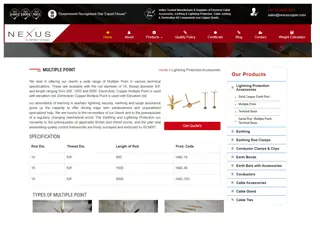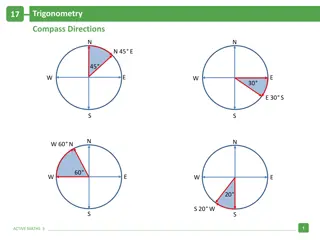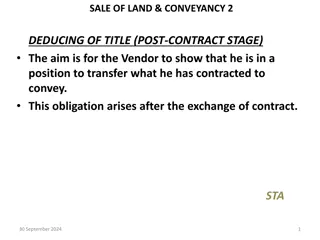
Understanding Title IX: Sexual Harassment Definitions and Procedures
Explore key concepts related to Title IX, including sexual harassment definitions, VAWA amendments, Clery Act updates, and the importance of advisors in the grievance process. Learn about the standard of proof, complaint intake procedures, the 60-day resolution rule, and the rights of respondents and complainants. Enhance your knowledge of Title IX policies to navigate cases effectively.
Download Presentation

Please find below an Image/Link to download the presentation.
The content on the website is provided AS IS for your information and personal use only. It may not be sold, licensed, or shared on other websites without obtaining consent from the author. If you encounter any issues during the download, it is possible that the publisher has removed the file from their server.
You are allowed to download the files provided on this website for personal or commercial use, subject to the condition that they are used lawfully. All files are the property of their respective owners.
The content on the website is provided AS IS for your information and personal use only. It may not be sold, licensed, or shared on other websites without obtaining consent from the author.
E N D
Presentation Transcript
What are We Investigating? Title IX: Sexual Harassment Definition VAWA Amendments to Clery Dating Violence, Domestic Violence, and Stalking Title IX: What does your policy say?
Standard of Proof Preponderance of the Evidence More Likely Than Not 50% and a Feather Educate the parties and their advisors Burden Not Shifted by the Preponderance Standard If equal on both sides, burden has NOT been met
Complaint Intake Process Is this a Title IX complaint? Dennis continually stares at Linda in your seminar. Is this sexual harassment? Anything else you need to know? What else, and why?
60 Calendar Day Rule Does NOT include Appeals NOT a hard rule Give periodic updates and notification if the institution must go past 60 days to resolve the complaint
Advisors Respondents and Complainants MUST have the equal opportunity to have advisors of their choosing present in ANY proceeding related to the resolution of a complaint This right is NOT afforded to witnesses Campuses can limit the role of the advisor but must do so equally Applies to stalking cases regardless of whether the stalking was sex or gender based Not required to provide the advisor Who advises the Respondent?
Advisors Respondents and Complaints are entitled to have ONE advisor of their choosing present during any meetings or proceedings conducted as part of the Title IX Grievance Process Advisor may be attorneys. Advisors may be staff members. Advisors may be other students. Advisor may ONLY participate as a silent observer. If the advisor tries to participate, remind them that they are unable to participate per the University s policies If the advisor continues to participate after being warned, you make request that the advisor remove them self from the proceeding When in doubt, call the Title IX Coordinator.






















